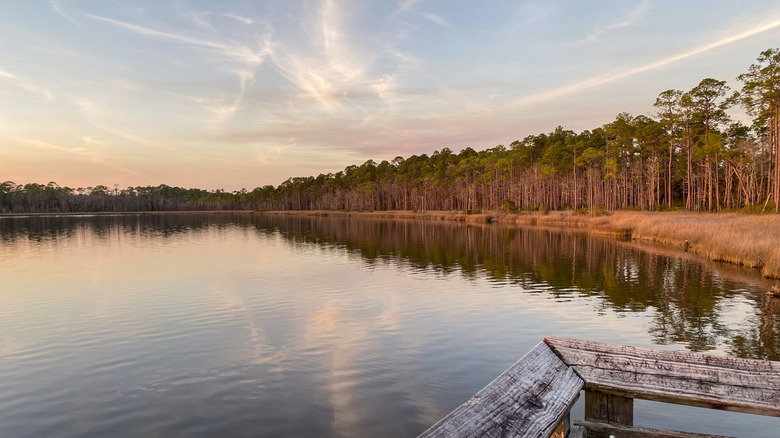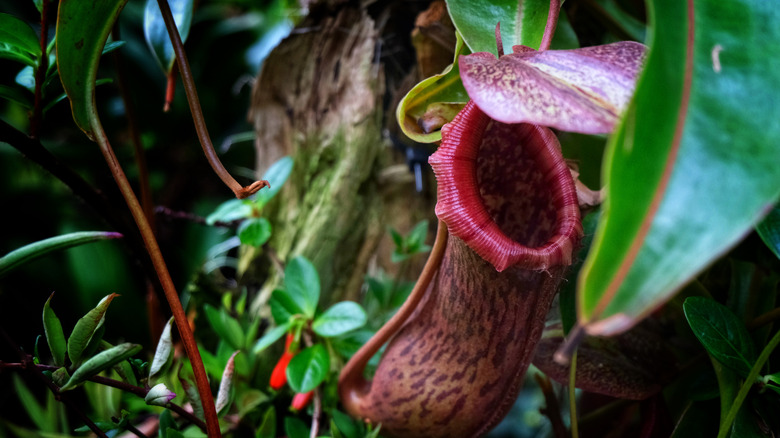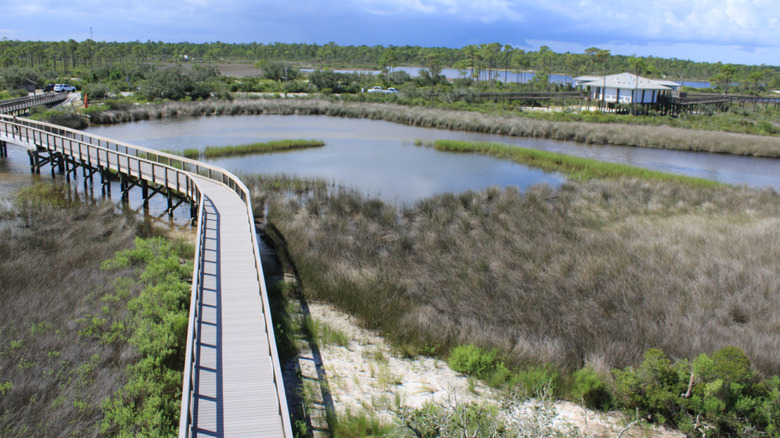Florida is a land of intriguing contrasts; from stunning, award-winning beaches to massive backroad trails through swamps full of wildlife, the Sunshine State is a peninsula full of diverse natural habitats as well as developed urban sprawl. One underrated destination in Florida’s southern panhandle is Tarkiln Bayou Preserve State Park, a swampy paradise with a big bayou that blends both fresh and saltwater marshes in a unique ecology that hosts unusual flora and fauna — including two species of carnivorous plants!
Situated just 32 miles from the crystal-clear water of Gulf Islands National Seashore in Pensacola, Tarkiln Bayou is a wonderfully quiet nature reserve in close proximity to the development of Pensacola, and is truly a hidden gem for naturalists and outdoors enthusiasts. The park is named after 19th-century tar kilns built by early settlers to harvest and process sap from the local yellow pine trees. The sap was turned into tar and used in soap making, as well as for sealant used in manufacturing wooden ships. Today, savvy visitors on the lookout might be able to identify the traditional “cat face” gouges where some of the old pines were tapped for their sap.
One of the most fascinating features of Tarkiln Bayou is that it’s the home to a rare, carnivorous plant called the pitcher plant, found only in this Gulf Coast region, as well as three other subspecies of the pitcher plant and the Chapman’s Butterwort, another entirely different species of carnivorous plant. Pitcher plants thrive in soils that lack nutrients, adapting for survival by becoming carnivorous and capturing small prey with their leaves, which are shaped like those tall, eponymous water vessels. Pitcher plants have beautiful blooms in varying colors but use their sweet scent and an alluring ultraviolet light to lure unsuspecting insects — and the occasional tiny lizard — to their deaths.
Pitcher Plants are just one example of the incredible biodiversity Tarkiln Bayou hosts
Tarkiln Bayou encompasses around 5,000 acres of wetlands and forest between the low floodplain of the Perdido River and Big Lagoon. Several hundred species of flora and fauna call this land home, and the park is continuing to expand with the help of The Nature Conservancy. The preserve has a half-mile wooden boardwalk – which doubles as an observation deck, complete with benches — that are ADA-accessible and perfect for a tranquil meander through the park. Species that inhabit the park include alligator snapping turtles, white-tailed deer, opossums, raccoons, and even bobcats. Tarkiln is part of the Great Florida Birding & Wildlife Trail, which means it’s also a great place to spot migratory birds, as well as native birds like woodpeckers, brown-headed nuthatches, yellow-breasted chats, tricolored herons, and even white-eyed Vireos.
Pitcher plants attract prey through their “pitfall trap.” They secrete a fragrance on the end of their “pitchers,” and emit an ultraviolet light, attracting prey. When the prey lands on the pitcher’s slippery lip, they fall in, and the plant then produces a sweet, waxy liquid in which to drown its victim deep in its gullet. Southeast Asia is also home to a number of pitcher plants, which trend bigger in size than the ones found in Florida. They’ve been known to consume even larger types of prey, as big as frogs. The Tarkiln Bayou Preserve is home to four types of pitcher plants: red, purple, white-topped, and parrot. Red pitchers are considered a designated species and rare. White-topped pitchers are also a designated species, but can be found throughout Tarkiln, and are particularly lovely to see when they’re at their most vibrant bloom, from March to May.



